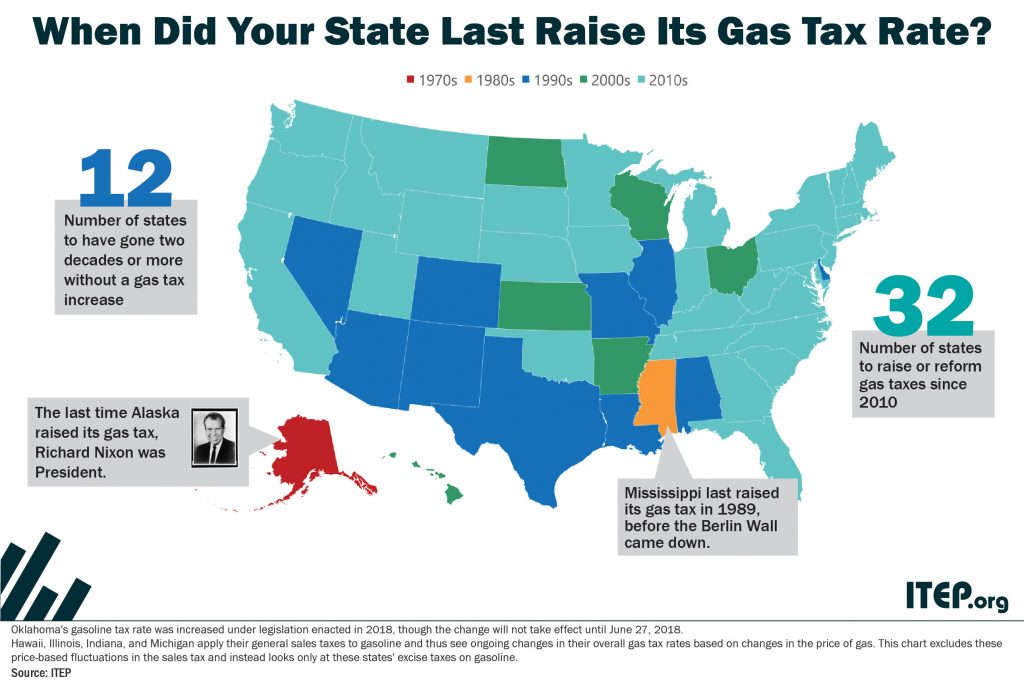State lawmakers are preparing their agendas for 2019 and looking at all sorts of tax and budget policies in the process, raising many familiar questions. Oregon legislators, for example, will try to fill in the blanks in a proposal to boost investments in education that left out detail on how to fund them, while their counterparts in Texas face the inverse problem of a proposed property tax cut that fails to clarify how schools could be protected from cuts. Similar school finance debates will play out in many other states. Alabama, Kansas, and Louisiana will look at gas tax updates, as Indiana and Mississippi will consider tobacco tax increases, and nearly every state has decisions to make about how to implement online sales taxes and what to do with the revenue.
— MEG WIEHE, ITEP Deputy Director, @megwiehe
Major State Tax Developments and Proposals
- OREGON’s Gov. Kate Brown has proposed her budget for the next biennium, which includes $2.6 billion in new spending for K-12 and higher education. The plan was light on the details for how this money would be raised, though does include a proposed increase to taxes on alcohol as well as to the corporate minimum tax. Gov. Brown is open to working with business leaders and others (like this coalition of strange bedfellows) on proposals for how to adequately fund education.
- Tackling school finance and property taxes will be a top legislative priority for TEXAS lawmakers this coming year. The Texas Commission on Public School Finance will be of little help as their recommendations focused on property tax cuts without providing ideas for how to fund them or ensure support for public education grows over time. Local leaders are also concerned about loss of local control via proposed property tax caps. Some are suggesting closing tens of millions in state tax exemptions as a source of funding for these conflictual goals.
State Roundup
- ALABAMA leaders will look yet again at updating the state gas tax, which is among the most out-of-date in the country. Some observers are encouraging the state to also ask other overdue questions about whether it is funding services in an adequate and fair manner.
- Lawmakers in ARKANSAS say they wish to avoid Kansas and Oklahoma-scale crises from enacting large tax cuts but are still pursuing a policy path that will lead to divestment in public services to benefit the wealthiest state residents. This piece serves as a reminder of the problematic economic reasoning underlying the failed Kansas tax experiment and should be a warning to lawmakers in states like Arkansas pursuing similar paths (even if on more moderated schedules).
- Tax policy bills coming up in the CALIFORNIA legislature include proposals to levy a gun tax on handguns and semi-automatic rifles, remove the sales tax on menstrual products and diapers, and require presidential candidates to release 5 years of tax returns to the Secretary of State in order to appear on the CA primary ballot.
- In the world of CALIFORNIA ballot initiatives, San Francisco’s Mayor London Breed has taken steps to ensure that the city’s newly enacted Proposition C will be able to get out of legal limbo so it can fund homeless services in the city. And a state senator is proposing a ballot measure that would limit “abuses” of the state’s inheritance property tax break by requiring heirs to live in the home.
- New rules for collecting sales tax in COLORADO that went into effect Dec. 1 are not generating holiday cheer for many small businesses in the state who are struggling to implement complex changes during holiday sales. Implementing charges for online sales tax are facing delays in
- Also in COLORADO, Gov.-Elect Jared Polis is talking about cutting the personal income tax rate while also funding full-day kindergarten and fixing the state’s transportation issues (the recent defeat of transit measures at the ballot leaves limited options to address the backlog of infrastructure projects).
- GEORGIA lawmakers, in a special session in mid-November, approved $470 million tax incentives and aid for areas and industries affected by Hurricane Michael, as well as bringing back a $40 million tax break for jet fuel.
- With the urging of the state’s Climate Commission, lawmakers in HAWAII will soon consider a carbon tax proposal that would be paid by motorists and large producers of carbon emissions alike (like power plants, airlines and shipping companies). Details remain undecided, but the tax would levy a fee on the production, distribution or use of fossil fuels.
- Voters in IDAHO approved a record $200+ million in supplemental property tax levies to fund public education, highlighting the inadequacies of state K-12 funding and motivating debate about the school finance formula during the 2019 legislative session.
- A coalition made up of business and health leaders is back at it in INDIANA to raise the cigarette tax by $2 a pack and raise the legal age of purchase to 21.
- After passing a convoluted income tax cut in 2018 that will be implemented in coming years on a complicated and uncertain timeline, IOWA lawmakers are already looking to slash revenue for state services even further, this time focusing on property taxes.
- A state task force in KANSAS finalized recommendations for a 10-year transportation plan that advises increases in the state’s gas tax, fees on electric vehicles, and allocating sales tax proceeds to fund transit projects.
- Speaking of transportation funding, an education and awareness campaign is launching in LOUISIANA to build support for raising the state’s gas tax. While the coalition is drafting legislation, an oppositional campaign (remember 2017?) is getting up and running.
- MARYLAND lawmakers have decided to give a $50 tax credit per deer to hunters who donate venison to organizations feeding the hungry.
- In MICHIGAN, GOP lawmakers are seeking to limit the power of the incoming administration and gut the recently voter-approved marijuana bill. Similar efforts are underway in WISCONSIN, which has a sordid history of legislative moves that shield actions that serve special interests and lock in partisan interest from public scrutiny.
- Also in MICHIGAN, General Motors may get to continue to benefit from tax breaks while closing plants and eliminating salaried jobs (though some groups are protesting this outcome) and Ford was just awarded over $200 million in additional tax breaks.
- In MISSOURI, the Kansas City Star is asking residents and lawmakers to reconsider their recent history of prioritizing tax cuts over investments in the state; meanwhile, the state’s fiscal situation is showing signs of trouble.
- Advocates in MISSISSIPPI are pushing for a cigarette tax hike; state residents support it.
- The city of Bozeman in MONTANA will once again be supporting efforts to allow local sales taxes in order to reduce reliance on property taxes. Montana is one of only five states that doesn’t levy a sales tax.
- OHIO’s House of Representatives passed a bill last week that would tie the hands of local governments, prohibiting them from imposing taxes and fees on the use, sales or consumption of plastics bags. The bill now moves to the state Senate. If signed, Ohio would join several other states who have passed similar legislation.
- During a special session last summer, lawmakers in UTAH earmarked $55 million in new revenue from online sales for tax breaks to “manufacturing companies” but have no further information about who will receive these benefits and what the state will get in return. At least one state lawmaker is considering filing a bill next session to address the seeming lack of evaluation and transparency.
- A bill to raise property taxes on residential and industrial property in order to increase education funding is heading to the WYOMING legislature early next year. This debate will inevitably spark debate over which new funding sources the state should consider to fund K-12 education.
What We’re Reading
- The Center on Budget and Policy Priorities has put out a must-read report on the ways that historical and contemporary racial inequities intersect with state fiscal policy, and how states can advance racial equity through better tax policy.
- Fitch Ratings, Governing, and Stateline each note that while this will be the first holiday shopping season since the Supreme Court gave states the ability to enforce sales taxes on online shopping, the amount of expected revenue is uncertain, and many states will miss out on that revenue altogether because they have been slower than others to act on the decision.
- CALIFORNIA’s Legislative Analysts’ Office is out with a new report on the taxation of sugary drinks and potential design options for a statewide soda tax.
- Ohio Policy Matters released a new report that outlines the merits of refundable tax credits for working families and makes the case for them in OHIO.
- The state of TEXAS is out with a new Tax Exemption & Tax Incidence Report, which you can download here.
- VIRGINIA could support communities of color by improving the state EITC, according to the Commonwealth Institute.
If you like what you are seeing in the Rundown (or even if you don’t) please send any feedback or tips for future posts to Meg Wiehe at [email protected]. Click here to sign up to receive the Rundown via email.





